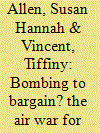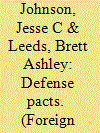|
|
|
Sort Order |
|
|
|
Items / Page
|
|
|
|
|
|
|
| Srl | Item |
| 1 |
ID:
103531


|
|
|
|
|
| Publication |
2011.
|
| Summary/Abstract |
Given the prominence of air power as a foreign policy tool, we attempt to clearly link the military process of dropping munitions on the target state to the accompanying diplomatic process between the attacker and the adversary. To explore the connection between the two processes, we look at the 1999 NATO bombing campaign over Kosovo, which allows us to isolate the influence of air power. Why were 78 days of NATO bombing needed to convince Miloševic to make concessions? Comparing expectations from both bargaining models and traditional coercive models, we find that the intensity of bombing, the duration of bombing, and mediation were important predictors of the Serbian government's behavior during the Kosovo crisis.
|
|
|
|
|
|
|
|
|
|
|
|
|
|
|
|
| 2 |
ID:
103533


|
|
|
|
|
| Publication |
2011.
|
| Summary/Abstract |
Do military alliances lead to peace or to war? Research has suggested that defensive alliances to potential targets deter dispute initiation (Leeds 2003b:427). This would seem to suggest that forming defensive alliances is a good policy prescription for those seeking to encourage peace. Yet, some argue that even if defense pacts have a deterrence effect, defense pacts may also have other effects that increase militarized conflict in the international system. Specifically, defense pacts may encourage member states to initiate and/or escalate disputes. In an analysis covering the period from 1816 to 2000, we evaluate these three potential effects of defense pacts-deterrence, initiation, and escalation. We find support for the hypothesis that defensive alliances deter the initiation of disputes but no evidence in support of the claims that states with defensive allies are more likely to initiate disputes in the international system or that targets with allies are more likely to respond to dispute initiation with further militarization. We conclude that defensive alliances lower the probability of international conflict and are thus a good policy option for states seeking to maintain peace in the world.
|
|
|
|
|
|
|
|
|
|
|
|
|
|
|
|
| 3 |
ID:
103532


|
|
|
|
|
| Publication |
2011.
|
| Summary/Abstract |
The article develops the insights of historical institutionalism and cognate work within International Relations to examine the development of security institutions within states, dealing specifically with the development of the National Security Council (NSC) in the United States. The case focuses on the creation and reproduction of the NSC as a means to fostering civil-military coordination within the US state. The article argues that exogenous shocks are crucial in providing the necessary freedom to change existing institutions, which are then set on new contingent paths. Substantively, it is argued that World War II and the experiences derived from it provided a critical juncture for the creation of new security institutions such as the NSC, and once created the NSC was characterized by forms of path dependence that have reproduced the institution over time. The article demonstrates how historical institutionalism can clarify causal mechanisms that better explain the origins and durability of internationally oriented security institutions within states.
|
|
|
|
|
|
|
|
|
|
|
|
|
|
|
|
| 4 |
ID:
103535


|
|
|
|
|
| Publication |
2011.
|
| Summary/Abstract |
This article explains the US foreign policy discourse surrounding human rights, democracy and the Internet as the pursuit of "technological closure" for the network. US policymakers draw upon international norms and values to construct a symbolically powerful argument regarding the valid material composition of the Internet. Through these arguments, the US creates a narrative that casts its vision for the Internet as moral, just and progressive. In contrast, opponents of the American vision of the Internet are cast as backward states impeding the flow of history. In the process, the contested nature of the technology and its contingent nature are sidelined, naturalizing and reifying its historically and culturally specific evolution, to the benefit of American foreign policy aims. I will outline the politics of identity construction, and the meaning attached to the technological structure of the Internet, as central to the ongoing contestation over its form. Finally, I will note how the narrative created by US foreign policymakers legitimizes their material practice of supporting anticensorship technologies.
|
|
|
|
|
|
|
|
|
|
|
|
|
|
|
|
| 5 |
ID:
103534


|
|
|
|
|
| Publication |
2011.
|
| Summary/Abstract |
The Financial Crisis in the late 1990s and the ongoing crisis have showed the importance of creating an early warning system (EWS) to lessen economic, political, and foreign policy fallout. Surprisingly, the EWS literature rarely considers the role of political institutions to detect economic dangers that can be harbingers of conflict. Controlling for common explanations in the literature, we use panel data for fifty developing countries from 1987 to 2004 to investigate the effect of political determinants for predicting economic crises. Although most political variables appear to have little influence in forecasting defaults or currency crises, models specified with bond ratings from the credit rating agencies can be helpful for predicting the onset of crisis. Our research is a first step toward gaining insights into how best to anticipate crisis that may prove beneficial particularly in light of the current global crisis.
|
|
|
|
|
|
|
|
|
|
|
|
|
|
|
|
| 6 |
ID:
103536


|
|
|
|
|
| Publication |
2011.
|
| Summary/Abstract |
The article outlines a framework for the analysis of religion and foreign policy. Despite the increased attention to religion in international relations, questions remain. Particularly controversial, yet relatively unexplored, is the role of religion in the foreign policies of states. We extrapolate from theories in the fields of international relations and comparative politics to explore religion's potential avenues of influence on foreign policy. There are potential tools of analysis in these fields, which can be fruitfully extended and applied to understand the role of religion in foreign policy. We propose a framework within which various causal pathways and mechanisms can be situated. We also show how contributions from the field of religion and politics might be used to frame theories and specify further hypotheses about religion and foreign policy. After identifying the main threads of these lines of research, we discuss how to apply them to the question of the role of religion in foreign policy and set out a new research agenda. We conclude that the potential of these theoretical approaches to the analysis of religion has not yet been exploited.
|
|
|
|
|
|
|
|
|
|
|
|
|
|
|
|
|
|
|
|
|